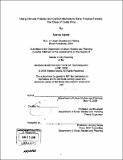| dc.contributor.advisor | Judith Layzer. | en_US |
| dc.contributor.author | Arpels, Marisa (Marisa Carina) | en_US |
| dc.contributor.other | Massachusetts Institute of Technology. Dept. of Urban Studies and Planning. | en_US |
| dc.coverage.spatial | nwpr--- | en_US |
| dc.date.accessioned | 2009-01-30T16:36:59Z | |
| dc.date.available | 2009-01-30T16:36:59Z | |
| dc.date.copyright | 2008 | en_US |
| dc.date.issued | 2008 | en_US |
| dc.identifier.uri | http://hdl.handle.net/1721.1/44360 | |
| dc.description | Thesis (M.C.P.)--Massachusetts Institute of Technology, Dept. of Urban Studies and Planning, 2008. | en_US |
| dc.description | Includes bibliographical references (p. 97-110). | en_US |
| dc.description.abstract | In the late 1980s and early 1990s, advocates for forest conservation thought that climate change could provide a lever to motivate developing countries to reduce deforestation. Fifteen years after the first climate change convention, however, global emissions from deforestation have increased. This thesis uses Costa Rica as a case study to examine how international climate policies and carbon markets have addressed greenhouse gas emissions from tropical deforestation. I argue that, to date, the international climate regime has failed to provide effective incentives to Costa Rica to finance its forestry reforms because of political decisions that favor forest protection in developed over developing countries. To be effective, the international climate regime needs to generate a substantial financial investment for avoided deforestation in developing countries and develop flexible policies that build capacity, promote sustainable forestry practices, and reward early reformers. | en_US |
| dc.description.statementofresponsibility | by Marisa Arpels. | en_US |
| dc.format.extent | 120 p. | en_US |
| dc.language.iso | eng | en_US |
| dc.publisher | Massachusetts Institute of Technology | en_US |
| dc.rights | M.I.T. theses are protected by
copyright. They may be viewed from this source for any purpose, but
reproduction or distribution in any format is prohibited without written
permission. See provided URL for inquiries about permission. | en_US |
| dc.rights.uri | http://dspace.mit.edu/handle/1721.1/7582 | en_US |
| dc.subject | Urban Studies and Planning. | en_US |
| dc.title | Using climate policies and carbon markets to save tropical forests : the case of Costa Rica | en_US |
| dc.type | Thesis | en_US |
| dc.description.degree | M.C.P. | en_US |
| dc.contributor.department | Massachusetts Institute of Technology. Department of Urban Studies and Planning | |
| dc.identifier.oclc | 276858910 | en_US |
